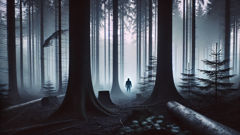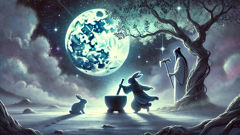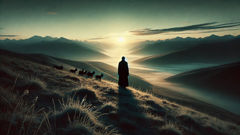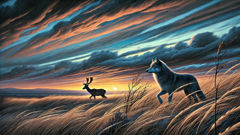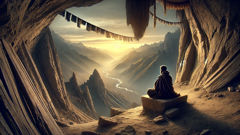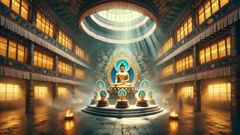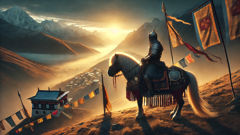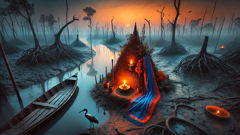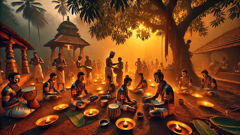Introduction
Few places in Europe hold as much whispered dread as Germany’s Black Forest. Sunlight seldom reaches the forest floor, where ancient firs huddle together and mists drift in perpetual silence. For centuries, the people of the Baden-Württemberg region have woven tales of spirits, witches, and shadowy beings into the fabric of their daily lives. Among all the legends, none strikes deeper fear than that of the doppelganger—a spectral double, eerily identical to a living person. To see your own double, or that of a loved one, is to invite calamity. It is not just an omen, but a harbinger that fate itself has turned its gaze upon you. In the year 1827, in a small village on the edge of the Black Forest, the Breuer family found themselves at the heart of such a tale. Their home, a sturdy timber-framed house with mossy shingles and windows always fogged with cold, stood on the last strip of cultivated land before the trees swallowed everything. The Breuers were respected—honest farmers with roots entwined in the soil as deeply as the oaks themselves. Yet, their world shifted one fateful autumn when whispers of a phantom double began to curl around their lives like a chill wind. Friends turned wary, and even the family’s loyal mastiff whimpered at empty corners. This is the story of how the legend of the doppelganger came to life in that isolated village—a story of fear, suspicion, and the terrible weight of seeing oneself through the eyes of fate.
Echoes in the Fog
The Breuer family’s life followed the rhythm of the seasons. Friedrich Breuer, the patriarch, rose before the sun to tend the cattle. His wife, Marta, moved quietly about the kitchen, her hands chapped from years of labor. Their children—Klara, seventeen, with eyes like storm clouds, and little Emil, barely nine—were as much a part of the land as the barn swallows nesting in the rafters. The village itself was little more than a cluster of cottages, a stone church, and a single winding road. At the edge of everything, the Black Forest pressed close, a dark tapestry that shifted with every breeze.
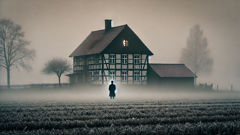
On a brisk October morning, with frost silvering the pumpkins in the yard, Friedrich noticed something strange. As he led his oxen toward the field, he glimpsed a figure in the mist—tall, broad-shouldered, wearing a hat just like his own. The man stood among the birches, motionless. Friedrich hailed him, but the figure turned and vanished into the trees, his face obscured. Unnerved, Friedrich dismissed it as a trick of the fog. Yet as days passed, other villagers began to talk. Old Herr Weiss claimed to have seen Friedrich walking toward the river while the real Friedrich was in his barn. Children muttered about Klara’s silhouette appearing on the church steps at night, though she’d sworn she’d never left home.
The sightings became more frequent. Shadows flitted at the edge of lantern light. A neighbor caught a glimpse of Marta, her apron fluttering, at her own window when Marta herself was visiting a friend. Whispers grew—first of spirits, then of something more insidious. The word ‘doppelganger’ passed from mouth to mouth, heavy with dread. In the Breuer household, tension mounted. Emil, sensitive to every shift in mood, refused to sleep alone. Klara avoided her own reflection, fearing she’d see not herself but her double’s empty eyes staring back.
One evening, Friedrich and Marta argued in hushed voices by the hearth. “We cannot let this fear rule us,” Marta said, her voice trembling. “We’ve done nothing to deserve this.” Friedrich stared into the flames. “It’s not what we’ve done. It’s what the forest wants.” That night, as wind howled and shutters rattled, Friedrich woke to see himself—his own face, pale and expressionless—standing at the foot of his bed. He tried to cry out, but the figure dissolved into shadow. He sweated through dawn, afraid to speak.
By November, the farm’s luck soured. Crops rotted in the field. The oxen fell ill without cause. Klara came down with a fever that would not break. The villagers kept their distance, crossing themselves as they passed the Breuers’ gate. With each new misfortune, suspicion grew. Was it truly a curse? Or was the Breuer family hiding something? In this climate of fear, the boundary between reality and nightmare thinned. The legend of the doppelganger had come home to roost—and no one could say who would be claimed next.
Reflections and Reversals
Winter arrived with brutal force, laying a heavy silence over the village. The Black Forest loomed closer than ever, its branches clawing at slate-gray skies. The Breuers withdrew into themselves, wary even of one another. Each member of the family began to sense the presence of their own double at the periphery of vision—a fleeting face in the window, a footstep echoing theirs in the darkened hall.
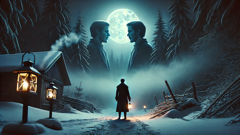
Klara’s fever worsened, and she drifted between sleep and waking, haunted by dreams of herself wandering beneath moonlit trees. She saw her own hands—pale, unfamiliar—pulling her deeper into the woods. Emil became quiet, drawing strange pictures of himself holding hands with another Emil, always standing at the forest’s edge. Marta tried to keep the house running, but her own resolve faltered when she glimpsed her reflection moving out of sync in a darkened pane of glass.
The village grew colder, not just from snow but from suspicion. Some whispered that Friedrich had made a pact with spirits for a bountiful harvest, and now the price had come due. Others believed Klara’s illness was punishment for hidden sins. Rumors festered until one evening, a crowd gathered at the Breuers’ door. Led by the pastor, they demanded answers.
Inside, Marta clung to Klara while Friedrich stood his ground. “We are cursed,” he said quietly, “but not by our own hand.” The pastor’s eyes narrowed. “Then whose?”
A voice—thin and trembling—came from Emil. “They want us to come to the woods.” The room fell silent. In his small hand, Emil held a charcoal drawing: the whole family, doubled, standing in a moonlit clearing. The villagers recoiled. Some insisted the Breuers be exiled. Others argued for prayer and mercy. In the chaos, Friedrich made a decision. “I will go,” he declared. “If it is me they want, I will face it.”
That night, as snow began to fall, Friedrich wrapped himself in his old coat and walked into the Black Forest. Behind him, Klara and Emil pressed their faces to the frosted glass, watching his lantern bob away. Marta wept silently, torn between fear for her husband and dread of what might return in his place.
In the woods, Friedrich found himself surrounded by silence so complete it rang in his ears. The trees seemed to shift and lean, shadows gathering at their roots. Then, just ahead, he saw it: his own figure, standing in a circle of moonlight. The doppelganger stared at him, eyes empty as winter sky. Friedrich’s breath came in clouds. He stepped forward, and the figure mirrored him exactly. A chill seized his heart as he realized what was expected: not confrontation, but surrender. He knelt, bowing his head. The figure did the same. In that moment, Friedrich understood—the doppelganger was not his enemy, but a reflection of everything left unspoken, every secret shame, every fear.
As dawn broke, only one set of footprints returned from the woods.
The Price of Shadow
The Breuer family waited through that long night, hearts pounding with every gust of wind against the shutters. As morning light seeped through the branches, Friedrich stumbled from the forest, eyes hollow, skin cold to the touch. Marta rushed to him, but he barely spoke. He carried with him an air of something lost—a part of himself surrendered to the woods. The children clung to their mother, uncertain whether their father had truly returned or if something else now wore his face.
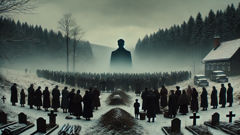
Days passed in uneasy quiet. Friedrich avoided mirrors and grew distant, as though his own shadow unsettled him. Klara’s fever broke, but she awoke changed—quieter, more reserved, gazing out at the forest for hours on end. Emil stopped drawing altogether, but he would not stray from his mother’s side. The villagers kept their distance, too frightened to confront what they could not understand. Yet, the worst had not yet come.
Late in February, tragedy struck. A fire erupted in the barn one night, flames devouring hay and livestock alike. Friedrich ran to battle the blaze but collapsed, coughing, overcome by smoke. He lingered for two days before passing away in his sleep. Marta wept for her husband, but deep down wondered if the man she mourned had truly been hers since his return from the forest.
At Friedrich’s funeral, as mourners gathered under slate skies, another sighting was whispered through the crowd—a figure in black, standing at the edge of the trees, face obscured by shadow but bearing Friedrich’s unmistakable shape. No one dared approach. The legend of the doppelganger had claimed its price.
Marta struggled to hold the family together. Klara’s silence deepened, and Emil withdrew from the world. The villagers’ fear turned to pity, then to a wary respect for the Breuers’ endurance. In time, Marta found herself drawn to the woods at dusk. She believed she could sense her husband’s presence there—sometimes a warmth, sometimes a cold shiver. Once, she thought she saw two silhouettes merging in the mist, impossible to tell which was real and which was only memory. She never spoke of it to her children.
Years later, when Emil was grown and Klara married into another village, the story of the Breuers became a warning passed from one generation to the next. The doppelganger, they said, comes not only for those who have sinned but for any who stray too close to the mysteries of the Black Forest. It is a reminder that every life casts a shadow—and sometimes, that shadow walks ahead.
Conclusion
The legend of the doppelganger lingered in the Black Forest long after the Breuer family’s ordeal faded into rumor. For those who walk beneath its tangled boughs, the story serves as both warning and comfort—a reminder that what we fear most may be found within ourselves. The village changed over time; new families settled, old superstitions softened. But on misty evenings when the wind moans and shadows lengthen across the fields, even the most skeptical remember what befell the Breuers. Some lock their doors a little earlier, glancing twice at their own reflections. Others leave offerings at the forest’s edge: a loaf of bread, a sprig of rosemary, a whispered prayer. They hope to placate whatever walks between the trees, whether spirit or memory or something far older than either. In the end, the doppelganger remains—a silent witness to human frailty and fear, blurring the line between fate and free will. And so the story endures, as all legends do, carried by the mist and the whispering pines: beware the double that walks beside you, for in its eyes you may see not only your future, but your soul laid bare.

